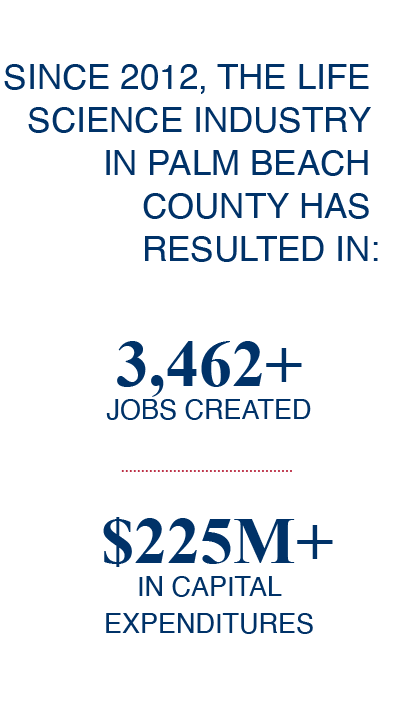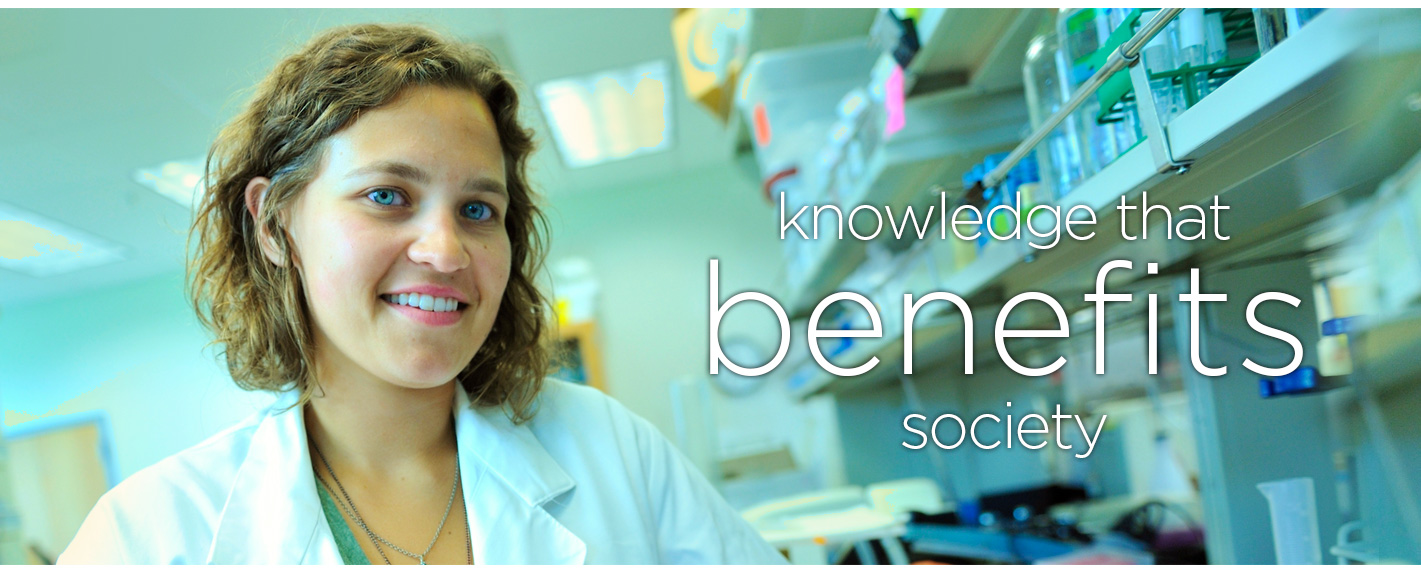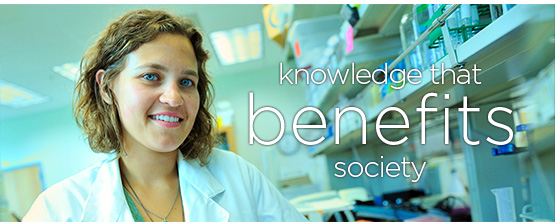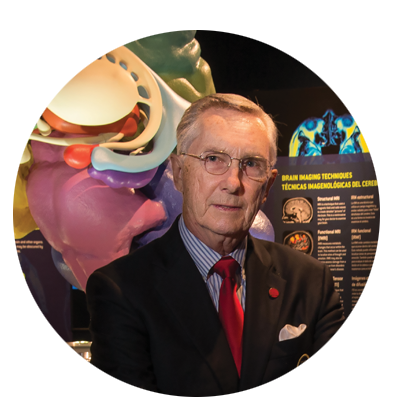- FAU Home
- Jupiter Campus
- Florida Atlantic Stiles-Nicholson Brain Institute

Florida Atlantic STILES-NICHOLSON BRAIN INSTITUTE
WHERE DISCOVERY COMES TO MIND
The brain is what makes us human and is the source of our individuality. It forms our
thoughts, passions, hopes and dreams, and
is constantly changing. Every time we think
and interact with others, our brain is altered
in complex, yet marvelous ways. With this in
mind, we invite you to join us as we build the
future of brain science and health at Florida
Atlantic University, and train the next
generation of scientists and researchers
through mentored advanced research.
Florida is the new center for the life sciences in the United States, and Florida Atlantic‘s Jupiter Campus is the site where scientific prowess converges. In partnership with two of the world’s leading research organizations –The Herbert Wertheim UF Scripps Institute and the Max Planck Florida Institute for Neuroscience the Florida Atlantic Stiles-Nicholson Brain Institute will offer high school, undergraduate and graduate students transformational experiences not found anywhere else in the world. The time is right for a breathtaking building that will allow for a new era of neuroscience research to take root and grow in partnership with its partner disciplines of molecular and cell biology, biochemistry and pharmacology, engineering and computer science.
The Stiles-Nicholson Brain Institute is made possible through a generous $10 million gift from David J.S. Nicholson, which expands on an initial investment from the State of Florida of $35 million, built to foster state-of-the-art research that, while emblematic of the exciting growth of South Florida, can touch all corners of the world.
To capitalize on this convergence of intellectual excellence, the Florida Atlantic Neuroscience Building will provide a state-of-the-art venue for facilitating inter-institute research opportunities. Under the leadership of Randy D. Blakely, Ph.D., Executive Director, Stiles-Nicholson Brain Institute, David J.S. Nicholson Distinguished Professor in Neuroscience and Professor of Biomedical Science of the Charles E. Schmidt College of Medicine, this 58,000 square foot research space will make lasting contributions to Florida’s life sciences core and its Jupiter neuroscience hub. Within its walls, cuttingedge basic science research will examine the underpinnings of a variety of brain disorders, including autism, Alzheimer’s disease, addiction, and neuroinflammation. It also creates and provides innovative research opportunities for STEM students who train alongside Florida Atlantic’s internationally-recognized scientists.

RETURN ON INVESTMENT
Brain health is essential for a long, happy and productive life.
Its impact is far-ranging, extending beyond our individual
selves to our local, national and global communities. A healthy
brain seeks solutions, solves problems, and enables us to think,
act and make the world a better place. Our individual and
collective futures depend on optimal brain health. Your support
will help achieve these goals, while helping others to live well –
today and in the future.
Achieving success starts with cultivating a pipeline of talented
scholars and researchers. Dr. Blakely and his team of funded
researchers were recruited and tasked to seed discovery in the
new building. The Florida Atlantic Stiles-Nicholson Brain Institute also will
drive increased enrollment of superior students in the fields
of neurobiology, bioengineering, bioinformatics, chemistry,
computational biology, genetics and engineering.
Job creation is another attractive outcome of this endeavor. We
envision the new facility supporting 20 principal investigators/
faculty, a similar number of research faculty and postdoctoral
students, and approximately 100 high school, undergraduate
and graduate students per year, who will each engage in stateof-
the-art and technologically advanced research training.
The anticipated increase in funding for research is another
reason why the Stiles-Nicholson Brain Institute is an important
piece to the Jupiter campus. With expanded space for
collaborative research, there is greater opportunity to capitalize
on increased federal funding from entities such as the National
Institutes of Health (NIH) and the National Science Foundation
(NSF), along with private entities looking to provide research
grants and gifts to impact brain science and health. Spaces
within the building will utilize a centralized lab model that
includes smaller research labs, creating clusters for research
teams and promoting a collaborative environment.

RETURN ON INVESTMENT
Brain health is essential for a long, happy and productive life.
Its impact is far-ranging, extending beyond our individual
selves to our local, national and global communities. A healthy
brain seeks solutions, solves problems, and enables us to think,
act and make the world a better place. Our individual and
collective futures depend on optimal brain health. Your support
will help achieve these goals, while helping others to live well –
today and in the future.
Achieving success starts with cultivating a pipeline of talented
scholars and researchers. Dr. Blakely and his team of funded
researchers were recruited and tasked to seed discovery in the
new building. The Florida Atlantic Stiles-Nicholson Brain Institute also will
drive increased enrollment of superior students in the fields
of neurobiology, bioengineering, bioinformatics, chemistry,
computational biology, genetics and engineering.
Job creation is another attractive outcome of this endeavor. We
envision the new facility supporting 20 principal investigators/
faculty, a similar number of research faculty and postdoctoral
students, and approximately 100 high school, undergraduate
and graduate students per year, who will each engage in stateof-
the-art and technologically advanced research training.
The anticipated increase in funding for research is another
reason why the Stiles-Nicholson Brain Institute is an important
piece to the Jupiter campus. With expanded space for
collaborative research, there is greater opportunity to capitalize
on increased federal funding from entities such as the National
Institutes of Health (NIH) and the National Science Foundation
(NSF), along with private entities looking to provide research
grants and gifts to impact brain science and health. Spaces
within the building will utilize a centralized lab model that
includes smaller research labs, creating clusters for research
teams and promoting a collaborative environment.

RETURN ON INVESTMENT
Brain health is essential for a long, happy and productive life.
Its impact is far-ranging, extending beyond our individual
selves to our local, national and global communities. A healthy
brain seeks solutions, solves problems, and enables us to think,
act and make the world a better place. Our individual and
collective futures depend on optimal brain health. Your support
will help achieve these goals, while helping others to live well –
today and in the future.
Achieving success starts with cultivating a pipeline of talented
scholars and researchers. Dr. Blakely and his team of funded
researchers were recruited and tasked to seed discovery in the
new building. The Florida Atlantic Stiles-Nicholson Brain Institute also will
drive increased enrollment of superior students in the fields
of neurobiology, bioengineering, bioinformatics, chemistry,
computational biology, genetics and engineering.
Job creation is another attractive outcome of this endeavor. We
envision the new facility supporting 20 principal investigators/
faculty, a similar number of research faculty and postdoctoral
students, and approximately 100 high school, undergraduate
and graduate students per year, who will each engage in stateof-
the-art and technologically advanced research training.
The anticipated increase in funding for research is another
reason why the Stiles-Nicholson Brain Institute is an important
piece to the Jupiter campus. With expanded space for
collaborative research, there is greater opportunity to capitalize
on increased federal funding from entities such as the National
Institutes of Health (NIH) and the National Science Foundation
(NSF), along with private entities looking to provide research
grants and gifts to impact brain science and health. Spaces
within the building will utilize a centralized lab model that
includes smaller research labs, creating clusters for research
teams and promoting a collaborative environment.

RETURN ON INVESTMENT
Brain health is essential for a long, happy and productive life.
Its impact is far-ranging, extending beyond our individual
selves to our local, national and global communities. A healthy
brain seeks solutions, solves problems, and enables us to think,
act and make the world a better place. Our individual and
collective futures depend on optimal brain health. Your support
will help achieve these goals, while helping others to live well –
today and in the future.
Achieving success starts with cultivating a pipeline of talented
scholars and researchers. Dr. Blakely and his team of funded
researchers were recruited and tasked to seed discovery in the
new building. The Florida Atlantic Stiles-Nicholson Brain Institute also will
drive increased enrollment of superior students in the fields
of neurobiology, bioengineering, bioinformatics, chemistry,
computational biology, genetics and engineering.
Job creation is another attractive outcome of this endeavor. We
envision the new facility supporting 20 principal investigators/
faculty, a similar number of research faculty and postdoctoral
students, and approximately 100 high school, undergraduate
and graduate students per year, who will each engage in stateof-
the-art and technologically advanced research training.
The anticipated increase in funding for research is another
reason why the Stiles-Nicholson Brain Institute is an important
piece to the Jupiter campus. With expanded space for
collaborative research, there is greater opportunity to capitalize
on increased federal funding from entities such as the National
Institutes of Health (NIH) and the National Science Foundation
(NSF), along with private entities looking to provide research
grants and gifts to impact brain science and health. Spaces
within the building will utilize a centralized lab model that
includes smaller research labs, creating clusters for research
teams and promoting a collaborative environment.




KEY FEATURES
In A Strategic Plan for the Race to Excellence, 2015-
2025, Florida Atlantic President John Kelly named neuroscience
as a pillar that will define the institution’s research
investments and create knowledge that benefits society.
The Stiles-Nicholson Brain Institute is a critical aspect of
this endeavor.
The first floor will be home to the Center for Brain Disease Modeling which will investigate mechanisms of
brain disorders, including Alzheimer’s, autism, addiction
and brain cancer, and will double the university’s current
capacity for behavioral analysis. The Center will support
a host of opportunities, including:
- Advanced behavioral research infrastruc ture
- Non-invasive recording and mapping of brain circuits
- Testing effects of early-stage medications
- Evaluation of impact of genetic and environmental changes on learning and memory, addiction, anxiety and social behavior.
Within the Center, the testing rooms of the Laboratory for Neurobehavioral Analysis will allow for synergistic neurobehavioral research and education for undergraduate, graduate and postdoctoral fellows – truly the next generation of brain scientists.
The first floor is a public area featuring a Reception Space, Lobby and Interactive Auditorium allowing for
a variety of configurations. From theater-in-the round to banquets, the lobby will be a choice venue for STEM-related presentations, lectures, meetings and other events.
A key feature on the second floor is the Center for Cellular Neuroimaging where the visualization of brain cells will take place. It’s here where super-resolution, dynamic cellular and brain circuit visualization will merge with computational and virtual reality resources to allow
researchers to peer deeply into the brain. This space will be enhanced by more than $1 million in already-acquired equipment and will house one of 24 Nikon Centers of
Excellence worldwide.
Also slated for the second floor is approximately 4,400 square feet of open lab space along with ample shared
technology and office spaces. The open design will stimulate communication and collaboration, flexibility for future needs, and collaborative use of research resources among researchers.
On the third floor, the Center for Computational
Neuroscience will house space for dry lab activity in addition to supercomputing that examines large data sets from molecules to neural activity. This, too, will be an active space for high school, undergraduate and graduate students studying computational biology,
chemistry and neuroscience.
The Center for the Resilient Mind will advance our
understanding of the brain and mechanisms used to
cope with stress, addiction, depression and aging
disorders. Key to this center will be the creation of formal partnerships between psychologists, engineers, social workers and educators. This interdisciplinary activity will boost our understanding of the link between brain function and social interactions.
The Center for Autism Research and Brain
Development will lead transformative science and clinical research to advance the understanding of
Alzheimer’s, addiction and autism. These diseases impact many people at local, national and global levels.

“The biggest scientific challenge of today is to gain a better understanding of the most complex computer ever found, the human brain. Understanding will beget solutions to neurodegenerative diseases which are rampant and plague most families.”
—David J.S. Nicholson
Chair, Stiles-Nicholson Brain Institute Foundation
NAMING OPPORTUNITIES
Withing the 58,000-square foot Stiles-Nicholson Brain Institute on Florida Atlantic's John D. MacArthur Campus in Jupiter, there are a variety of centers, scholars and spaces available for naming.
Centers
| Center for Brain Disease Modelling | $2,000,000 |
| Center for Advanced Cellular Neuroimaging | $2,000,000 |
| Center for Autism Research and Brain Development | $2,000,000 |
| Center for Computational Neuroscience | $2,000,000 |
| Center for Resilient Mind | $2,000,000 |
| Center for Neurodegenerative Disease Research | Funded |
Spaces
| First Floor Reception, Lobby & Interactive Auditorium (combined) | $1,500,000 |
| Interactive Auditorium | $1,000,000 |
| Open Lab, Second Floor (2 available) | $1,000,000 |
| Open Lab, Third Floor (2 available) | $1,000,000 |
| First Floor Collaboratory | $750,000 |
| Laboratory for Neurobehavioral Analysis | $500,000 |
| Second Floor Crossroads | $500,000 |
| Third Floor Crossroads | $500,000 |
| Second and Third Floor Collaboratory (2) | $500,000 |
| Dry Lab (3) | $500,000 |
| Outdoor Patio and Gathering Garden | $500,000 |
| Meeting Center (2) | $250,000 |
| Brain Institute Executive Director Office | $200,000 |
| Research Director’s Office (4) | $100,000 |
| Break Room (3) | $75,000 |
| Teacher Advancement Office (2) | $50,000 |
Scholars
| Distinguished Professorship in Neuroscience | Funded |
| Endowed Addiction Research Professorship | $3,000,000 |
| Endowed Alzheimer’s Research Professorship | $3,000,000 |
| Endowed Autism Research Professorship | $3,000,000 |
| Endowed Parkinson’s Research Professorship | $3,000,000 |
| Neuroscience Undergraduate Pipeline Scholarship/Fellowship Fund | $1,000,000 |
| Name the SNBI Signature Lecture Series | $1,000,000 |
| Endowed Visiting Scholars Program for World Class Faculty | $500,000 |
| Endowed Summer Research Undergraduate Fellowships to Enhance Diversity | $500,000 |
| Named Undergraduate Neuroscience Scholarship | $250,000 |
| Distinguished Neuroscience Lecturer | $250,000 |
| Named Graduate Neuroscience Fellowship | $250,000 |
| ASCEND Fellows Program Fund | $50,000 |
| Diversity Fellowships | $30k each |
| International Graduate Fellowships | $30k each |
JOIN US.
An exciting neuroscience ecosystem is growing and flourishing on Florida Atlantic University’s Jupiter Campus. Here, the Stiles-Nicholson Brain Institute will usher in a new era of collaboration among the world’s titans of research. The synergy created by bringing together the Max Planck Florida Institute, which studies fundamental aspects of brain structure and function, with Florida Atlantic and its research on mechanisms perturbed in brain chemistry and physiology that result in brain disorders, in conjunction with The Herbert Wertheim UF Scripps Institute’s work on interventional strategies makes for a powerhouse hub of neuroscience discovery. It also fosters a phenomenal opportunity to attract the world’s brightest scientists and students to Palm Beach County.
CONTACT INFORMATION

“The new building, and the exciting research and education it makes possible, will leave an indelible mark on our university, our community, and our field that we will all be proud to say ‘we were there when it happened.’”
— Randy D. Blakely, Ph.D.
Executive Director, Stiles-Nicholson Brain Institute







